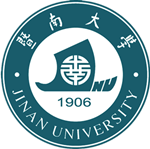School Badge

About Jinan University
Jinan University is the first government-founded overseas Chinese university in China. The word “Jinan” comes from “Shang Shu – Yugong”: “The east is gradual in the sea, the west is being in the flow of sand, Shuo Nan Ji, the sound of teaching is finished in the four seas.” It means facing the South Ocean and spreading Chinese culture to the four seas and the five continents. Currently, the university is a national “double first-class” university jointly built by the Central United Front Work Department, the Ministry of Education and Guangdong Province, and is directly under the management of the Central United Front Work Department.Jinan University is one of the oldest universities in China. The predecessor of the university was the Jinan Academy, which was founded by the Qing government in Nanjing in 1906. Later it was moved to Shanghai and renamed as National Jinan University in 1927. During the war against Japan, it was moved to Jianyang, Fujian Province, and in 1946, it was moved back to Shanghai and merged with Fudan University and Jiaotong University in August 1949. After the founding of New China, Jinan University was rebuilt in Guangzhou in 1958, and was once closed during the Cultural Revolution, but was reopened in Guangzhou in 1978. In June 1996, Jinan University became a key university for the 21st century, and in June 2015, it was selected as a key university for the construction of high-level universities in Guangdong Province, and in September 2017, it was selected as a national “double first-class” university. In August 2019, the Central United Front Work Department, the Ministry of Education and the Guangdong Provincial People’s Government decided to jointly build Jinan University. In February 2022, the university was selected as one of the second round of “double first-class” universities in China.
The University is known as the “highest school for overseas Chinese” and adheres to the motto of “faithfulness, integrity and respect”, focusing on cultivating talents with the excellent traditional Chinese moral culture. Since its establishment, the university has trained more than 400,000 students from more than 170 countries on five continents and from Hong Kong, Macao and Taiwan, which is a great success.
As one of the universities with the longest history in China, Jinan University has an important position in the history of Chinese higher education: the first university founded by the state for overseas Chinese higher education, one of the famous universities whose name has been used for a hundred years, the first university in China to try out the credit system, the first university to open a medical school in a comprehensive university, the first university to establish a research institute for overseas Chinese issues, the first university to establish a business department ……
At present, the university has a full range of disciplines, with 38 colleges, 58 departments and 27 research institutes directly under the university; 105 undergraduate majors, 26 first-level doctoral degree granting points, 41 first-level master’s degree granting points and 32 professional degree authorization categories; 19 postdoctoral mobile stations and 1 postdoctoral research station.
In recent years, with the efforts of teachers and students, the university has significantly improved its discipline construction and strength. At present, there are 1 national “double first-class” construction discipline, 4 national key disciplines, 8 State Council Overseas Chinese Affairs Office key disciplines, 2 State Administration of Traditional Chinese Medicine key disciplines, 22 Guangdong key disciplines, 12 Guangdong key disciplines, and 1 Guangdong key interdisciplinary discipline. There are 22 Guangdong key disciplines at the first level, 12 Guangdong key disciplines at the second level, and 1 Guangdong key cross-discipline. Thirteen disciplines, including chemistry, clinical medicine, engineering, pharmacology and toxicology, material science, biology and biochemistry, agricultural science, environmental science/ecology, botany and zoology, molecular biology and genetics, general social science, neuroscience and behavior, and computer science, have been ranked in the top 1% of the ESI world. In the fourth round of discipline evaluation by the Ministry of Education, 30 first-level disciplines of the university were listed, ranking third in the number of universities in the province, among which journalism and communication was rated A-, and applied economics, Chinese language and literature, biology and business administration were rated B+.
There are 2,732 full-time teachers in the university, including 8 academicians of the two academies (including double-appointed), 9 foreign academicians, 21 candidates of the major talent projects of the Ministry of Education, 43 recipients of Outstanding Youth and Excellent Youth, 48 “Pearl River Scholars”, 2 national teaching masters, 902 people with senior titles, 1,064 people with associate titles, and 1,064 people with Ph. There are 902 people with senior titles, 1,064 people with associate titles, 1,160 doctoral supervisors and 2,218 master’s supervisors.
The university has become a popular university for overseas Chinese, Hong Kong, Macao and Taiwan students to apply for further studies, and the largest training base for high quality talents from Hong Kong, Macao, Taiwan and overseas. The university has 31 national first-class professional construction points, 21 provincial first-class professional construction points, 8 national characteristic professional construction points, 1 national experimental zone for innovation of talent cultivation mode, 2 national pilot projects for comprehensive reform of professional, 3 national experimental teaching demonstration centers, 3 national off-campus practical education bases for college students, 46 national first-class undergraduate courses, 8 national high-quality courses (including bilingual teaching demonstration courses), and 8 national bachelor courses. The university is a national base for cultural quality education for college students, a national base for teaching Chinese as a foreign language, and a base for Chinese language education of the Overseas Chinese Affairs Office of the State Council.
The university has 45,180 full-time students, including 29,127 undergraduates, 16,053 postgraduates, and 13,580 overseas students from Hong Kong, Macao, Taiwan and abroad. The school has a rich and colorful campus culture, exciting club activities, a strong atmosphere of innovation and entrepreneurship, and students have made many achievements in high-level events at home and abroad, and Jinan athletes such as Su Bingtian, Chen Aisen and Xie Siyi have won glory for their country in major international events such as the Olympic Games. The university has been selected as one of the first demonstration universities in China to deepen the reform of innovation and entrepreneurship education. Graduates of JNU are highly praised by employers at home and abroad, and their employment rate has always ranked among the top of similar institutions.
The university has signed 707 academic exchange and cooperation agreements with 419 institutions of higher education and cultural and scientific research institutions in 62 countries on five continents, Hong Kong, Macao and Taiwan. The university is an enrollment institution for Chinese government scholarships to study in China, with 130 enrollment points in 77 countries around the world, and an international college with all-English teaching. There are 2,736 foreign students in school, coming from 101 countries and regions, including 1,939 undergraduates and 268 postgraduates.
The university has a strong academic culture and a large number of talents, and its alumni are all over the world, “where there is sea water, there are Jinan people”, especially in Hong Kong and Macao. Wu Xueqian and Li Lanqing, former vice premiers of the State Council, Li Guangqian, a famous overseas Chinese leader and the first president of the University of Singapore, Xu Dunmao, former chairman of the Thai parliament and former vice prime minister, Tan Qichang, Deng Ximing, Hou Fusheng and Zeng Yi, martyrs Jiang Shangqing, Chen Zhenhe (overseas Chinese), Fu Baolu and Fu Ke (overseas Chinese), as well as many famous people from the government, business and industry, and the cultural and educational circles in the mainland, Hong Kong, Macao and Taiwan in recent years are all distinguished alumni of Jinan University. The University has had distinguished alumni from different periods.
The university has five campuses in Guangzhou, Shenzhen and Zhuhai, with the main campus in Shipai, Guangzhou. The campus covers a total area of 2,143,000 square meters, with a building area of 1,810,100 square meters and a student dormitory area of 451,800 square meters. The university library has a collection of 4,058,900 books. The university has 10 affiliated hospitals, including 4 tertiary hospitals.







